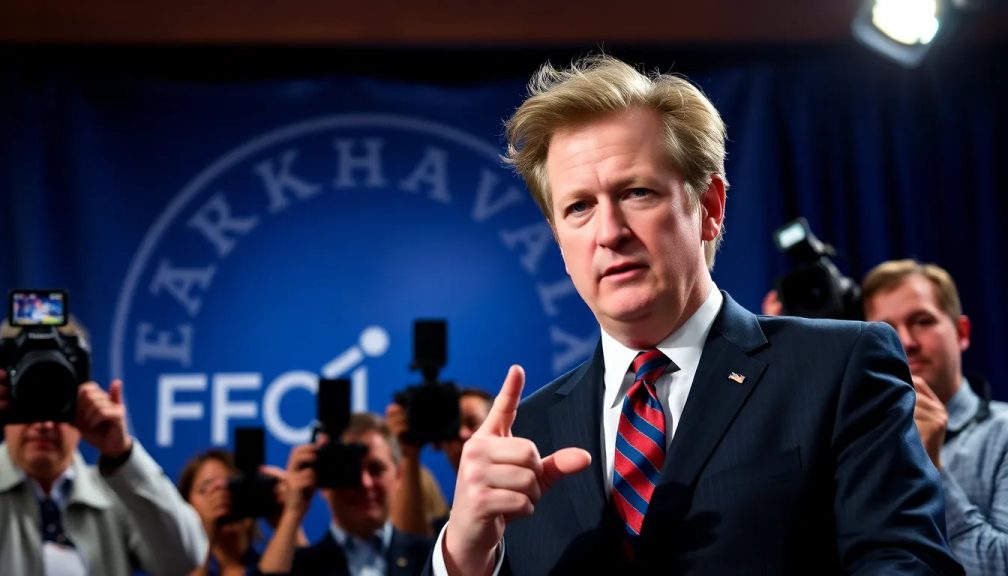Rand Paul criticizes FCC chair for intervening in ABC Kimmel issue

The intersection of media, politics, and free speech is a complex and often contentious arena, especially in the current climate of heightened scrutiny and division. Recently, comments made by FCC Chair Ajit Pai regarding the late-night television host Jimmy Kimmel have ignited a fiery debate, with significant implications for how free speech is perceived and regulated in America. As lawmakers from both sides of the aisle weigh in, the conversation reveals deeper issues about censorship, power, and the responsibilities of both the media and the government.
Senator Ted Cruz (R-Texas), the chair of the Senate Commerce Committee overseeing the Federal Communications Commission (FCC), has expressed sharp criticism of Pai’s remarks, suggesting they represent an alarming trend toward government overreach in matters of speech. The controversy centers around comments made by Pai, who suggested that ABC, the network airing Kimmel's show, could face consequences if it does not take action regarding Kimmel’s content.
The Role of Government in Media Regulation
Government intervention in media can be a double-edged sword. On one hand, it can protect the public from harmful content; on the other, it risks infringing upon free speech. Cruz, while acknowledging that Kimmel has often mocked him publicly, warned against using government power to dictate what media can say, arguing that such actions could ultimately backfire on conservatives.
- Potential for Abuse: Government control over media speech could lead to selective enforcement, where only certain voices are silenced.
- Historical Precedents: There are numerous examples where government intervention has led to the suppression of dissenting opinions, raising concerns about the trajectory of free expression in the United States.
- Long-Term Consequences: Cruz cautioned that if the precedent is set, future administrations could utilize similar tactics against their political opponents.
The crux of the issue lies in the balance between maintaining a free press and ensuring responsible reporting. The FCC's role traditionally has been to regulate communications in the public interest, but how that translates into action is often contentious.
The Kimmel Controversy Explained
The incident that sparked the debate involves a monologue by Jimmy Kimmel where he criticized the MAGA political movement in the context of a tragic event. He stated, “We hit some new lows over the weekend with the MAGA gang desperately trying to characterize this kid who murdered Charlie Kirk as anything other than one of them.” This comment drew ire from conservative lawmakers who felt it was inappropriate and politically charged.
Cruz emphasized that while he finds Kimmel’s comments offensive, he believes that government should not wield the power to silence individuals based on their political opinions. He articulated a poignant analogy, comparing the allure of governmental power to the seductive nature of the One Ring from J.R.R. Tolkien's narratives, suggesting that such power can corrupt even the most well-intentioned actors.
The Dangers of Censorship in Political Discourse
In discussions about censorship, it is vital to consider the broader implications of allowing any form of speech regulation, particularly in political contexts. Censorship can stifle vital discourse and create an environment where only dominant narratives are allowed to flourish.
- Stifling Dissent: Censoring opposing viewpoints undermines the foundational principle of democracy, where open discussions are essential for progress.
- Chilling Effects: Knowledge of potential repercussions can lead to self-censorship among media figures, which could diminish the diversity of opinions presented to the public.
- Public Trust: When audiences perceive media as being influenced by governmental pressure, trust in journalism can erode, leading to further polarization.
Cruz's warning resonates particularly in a political environment where media figures are increasingly facing backlash for expressing controversial opinions. By advocating for a hands-off approach, he echoes a sentiment shared by many who fear the slippery slope of governmental control over free speech.
Public Reactions and the Political Landscape
The response to the Kimmel incident has been polarized, reflecting broader societal divisions. Supporters of Kimmel argue that his right to free speech should be upheld, regardless of how offensive his comments may be. Conversely, critics from the right view his remarks as emblematic of a larger issue within mainstream media, which they claim consistently biases against conservative viewpoints.
This situation has sparked calls for discussions about the role of social media and traditional media in amplifying or suppressing political opinions. With social media platforms now serving as primary sources of information for many, the question of how these platforms regulate speech becomes increasingly pertinent.
The Future of Free Speech in America
As the debate continues, the future of free speech in America hangs in the balance. The tension between media accountability and the right to express one's views is at the forefront of contemporary discourse. Cruz's comments serve as a reminder of the risks associated with government overreach, particularly concerning speech regulation.
In light of these events, it is essential to remain vigilant about protecting the rights of individuals to express dissenting opinions, even when those opinions are unpopular. The implications of this debate extend far beyond the Kimmel controversy, touching on foundational principles of democracy and the ongoing struggle for a society that values diverse perspectives.
For a deeper dive into the political intricacies surrounding this issue, you might find this video insightful:




Leave a Reply